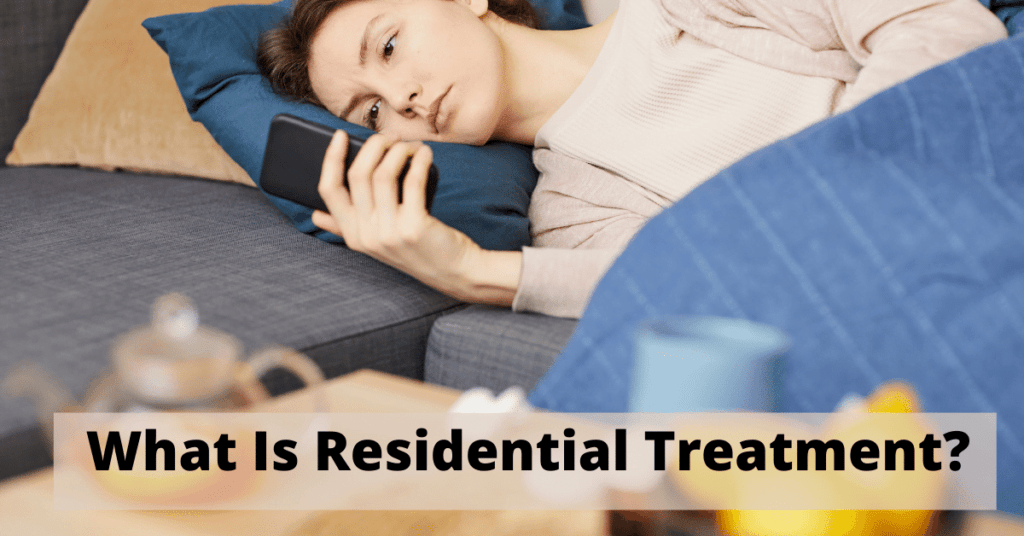Contents
- 1 What Is Residential Treatment?
- 2 How Does It Work?
- 3 Issues Residential Treatment Can Treat
- 4 Benefits Of Residential Treatment
- 5 How Much Does It Cost?
- 6 Drawbacks Of Residential Treatment Programs
- 7 What To Look For In A Residential Treatment Program?
- 8 How do I choose one?
- 9 Activities Provided In Residential Treatment
- 10 How To Take Care Of Someone Who’s Under Residential Treatment?
- 11 Tips For Opting For Residential Treatment
- 12 Conclusion
What Is Residential Treatment?

Residential treatment is a way for people to become sober and recover from addiction. It typically lasts for one to two years and the person receives treatments such as therapy and counseling sessions, medication, and other resources. These programs can be alternative, 12-step, and faith-based. The most important thing is that they provide a safe environment for the client to recover in and make new friends and support networks.
Some people enter a residential treatment program while going through rehab or detox. Others choose to do it on their own after an intervention from friends and family. It is best to have a team that will support you in your addiction recovery, whether that’s individual counseling, group therapy, or medication. These programs can be alternative, 12-step, and faith-based. The most important thing is that they provide a safe environment for the client to recover in and make new friends and support networks.
How Does It Work?
These programs typically last two years and the person receives treatments such as therapy and counseling sessions, medication, and other resources.
The first step is to admit that you need help with your addiction. You may not realize that you’re hurting those around you, but it’s important to understand what you’re doing to yourself physically, emotionally, socially, etc. before moving forward.
For some people, it may be easier to talk to a therapist, counselor, or psychiatrist before signing up for the program. Going to therapy once or twice a week can prepare you for what’s ahead and give you tools to manage your addiction on a daily basis.
Issues Residential Treatment Can Treat
Addiction is not the only issue that can be treated with residential treatment. Other issues that can be addressed include:

- Addiction
- Depression
- Anxiety
- Bipolar Disorder
- PTSD
- Eating Disorders
- Obsessive-Compulsive Disorder
- Personality Disorders
Residential treatment offers a high level of care and support, which can be crucial for someone struggling with one of these issues. The staff at the treatment center will work with you or your loved one to develop a treatment plan that addresses the individual’s specific needs. This may include therapy, medication, and educational programs.
If you are struggling with one of these issues, residential treatment may be the right option for you. The staff at the treatment center will work with you to develop a treatment plan that addresses your specific needs. This may include therapy, medication, and educational programs. Residential treatment can be an excellent way to get help for addiction or another issue. Be sure to do your research before enrolling in a program.
Benefits Of Residential Treatment
The benefits of a program like this are that you get everything you need to stay sober under one roof. The food is provided, the staff is trained to deal with addiction, and it can be cheaper than paying out-of-pocket for private therapy sessions on top of rent/mortgage payment(s), transportation expenses, and other bills. The major benefits are-

- You get 24/7 supervision.
- You will be in a safe environment where you can recover with like-minded individuals.
- It’s typically cheaper than paying for every aspect of treatment yourself, especially if you have private insurance coverage.
- You get to focus on yourself and your addiction without having to worry about other factors.
- The program can provide you with the tools you need to stay sober after graduating.
- The staff is typically very well-trained in addiction and can provide you with support when needed.
How Much Does It Cost?
This varies depending on the program. Some are government-funded and will not charge you anything, while others may have a sliding scale fee. The average cost is about $30,000 per year, but there are many programs that range from $10,000 to $60,000.
It is important to do your research and find the best program for you and your budget. There are many programs out there that will work with you to make payments.
If you have been seeing a therapist for years or attending group therapy sessions, ask if they will be willing to write letters of referral for you. It may help the caseworker at the treatment center decide to accept your application. In some cases, you may have to pay for the entire duration of your stay upfront. This is because those who enter with an insurance plan will often use it as a co-pay for their stay. It can also be helpful to bring someone with you, whether that’s a friend or family member who is familiar with your situation. This will help keep you accountable and they can encourage you to stick with the program.
Drawbacks Of Residential Treatment Programs
 The drawbacks of a program like this are that it can be expensive and most insurance companies don’t cover the majority of the costs unless you have private coverage. Also, some people may not want or need supervision 24/7 and others may feel overwhelmed in such an environment. It is important, to be honest with yourself and the staff about how you’re feeling so that they can help you adjust and/or continue with the program.
The drawbacks of a program like this are that it can be expensive and most insurance companies don’t cover the majority of the costs unless you have private coverage. Also, some people may not want or need supervision 24/7 and others may feel overwhelmed in such an environment. It is important, to be honest with yourself and the staff about how you’re feeling so that they can help you adjust and/or continue with the program.
The major drawbacks are-
- The program may not fit your needs or preferences, which could lead to relapse.
- There may not be enough individualized therapy or counseling sessions to address all of your needs.
- If you don’t like the program, it will be very difficult to stay sober when there are temptations in your everyday life (i.e. bars, parties).
The drawbacks are that you’ll be surrounded by drug-using influences during your recovery process, which may lead to cravings and frustration. Also, if the program is faith-based, it may not work for everyone’s belief systems or lifestyle choices.
What To Look For In A Residential Treatment Program?
There are many different types of residential treatment programs out there, as well as different lengths and costs to them as well. There are faith-based programs, those that follow an alternative route such as holistic or non-12-step programs, and those that combine all three.
It is important to find a program that fits your needs and preferences. Some people want both types of medicine to be provided, while others prefer one over the other. Some want faith-based programs, while others are looking for a non-religious program.
If you are unsure which route to go with, there are many articles about residential treatment on this site that can help you make an informed decision.
How do I choose one?
There are many different types of residential treatment programs out there, as well as different lengths and costs to them. It is important to find one that fits your needs and preferences.
It can be helpful to talk with others who have been through these programs in the past, either someone you know personally or reading reviews online. This will help prevent making any poor decisions based on assumptions or incorrect information.
When it comes to selecting a program, consider whether the location is convenient for you. Do you have a car to drive there while going through treatment? Will it be close enough for your family to visit easily?
You should also think about what types of things you will need while staying in a program like this. What if your doctor or clinic is far away? Is there someone here who can drive you to those appointments? Is the program close enough for you to make it to your child’s school every day?
Activities Provided In Residential Treatment

In any residential treatment program, you will be taking part in many different types of groups and counseling sessions. There may be some that are affiliated with the program, however, you’ll likely have to pay out of pocket for anything outside of it. The activities will be dependent on your schedule and whereabouts within the facility.
There are many different types of residential treatment programs available, each with its own advantages and drawbacks. It is important to find one that fits your needs and preferences before enrolling. This includes considering the program’s location, cost, and activities. Talk to others who have been through a program like this to get an idea of what to expect while there.
It can be helpful to talk with others who have been through these programs in the past, either someone you know personally or reading reviews online. This will help prevent making any poor decisions based on assumptions or incorrect information.
You should also think about what types of things you will need while staying in a program like this. What if your doctor or clinic is far away? Is there someone here who can drive you to those appointments? Is the program close enough for you to make it to your child’s school every day?
How To Take Care Of Someone Who’s Under Residential Treatment?

A better game plan is to use some of their loved one’s traits as inspiration for recovery. For instance, if they loved to do crossword puzzles, you might suggest spending more time on them instead of watching TV or drinking beer at night. They might also like to plant some flowers in the garden or start doing some other type of hobby that they used to enjoy.
The first step is to establish a connection with your loved ones before trying to help them. Spending time with them and getting to know their interests can go a long way towards helping them continue on the path of recovery.
It’s best not just to talk about drugs and alcohol but also try and focus on what you two used to do together when things were good. This can help create some positive memories and emotions that your loved one can reflect on later.
Residential treatment is not the only form of treatment available, but it is one of the most intensive. There are many different types of residential treatment programs available, each with its own advantages and drawbacks. It is important to find one that fits your needs and preferences before enrolling. This includes considering the program’s location, cost, and activities. Talk to others who have been through a program like this to get an idea of what to expect while there.
It can be helpful to talk with others who have been through these programs in the past, either someone you know personally or reading reviews online. This will help prevent making any poor decisions based on assumptions or incorrect information.
When it comes to helping a loved one through addiction, many people find themselves at a loss for what to do. They may feel like they need to do something but don’t know where to start. One of the best ways to help someone struggling with addiction is by enrolling them in a residential treatment program. This type of program offers a high level of care and support, which can be crucial for someone in the early stages of recovery.
There are many different types of residential treatment programs available. So it is important to do your research before enrolling. Consider the program’s location, cost, and activities to see if it is a good fit for you or your loved one. Talk to others who have been through a program like this to get an idea of what to expect while there.
If you are looking for a residential treatment program for yourself or a loved one, be sure to do your research first. Consider the program’s location, cost, and activities to make sure it is the right fit. Talk to others who have been through a program like this to get an idea of what to expect while there. Residential treatment can be an excellent way to get help for addiction, but it is not the only option. There are many different types of programs available, so be sure to find one that fits your needs and preferences.
Tips For Opting For Residential Treatment
Residential treatment can be an expensive option. It’s important to consider the pros and cons of every type of treatment that you’re looking into. There are some situations when residential treatment is necessary, like drug rehabilitation for someone who is suffering from addiction. However, if your child doesn’t need it in order to recover. Then you might want to look into other options like day treatment or inpatient/outpatient care in order to save money.

Always consider value: Residential treatment is expensive and if you don’t need it in order to recover. Then there are other options that will help save money.
Keep your child’s recovery a priority: If they’re not ready for intense therapy and/or the issues they have can be managed with outpatient or day treatment. This might be a better solution for the entire family.
Make sure you understand the program: Residential treatment can last for a few weeks or a few months. So it’s important to make sure you understand the program and what is expected of your child and your family.
Ask questions: If there are aspects of the program that you don’t understand, or if you’re not sure that it’s the right fit for your family. Don’t be afraid to ask the staff questions. They should be more than happy to answer any of your concerns.
Residential treatment can offer a number of benefits for children who are struggling with behavioral or emotional problems. But it’s important to weigh the pros and cons before making a final decision. Make sure you understand the program and if it’s right for your family.
These treatment plans can last anywhere from a few weeks to a few months, depending on the severity of the issues. And how much help is needed in order to overcome them? The service offered by residential treatment centers can be expensive. But there are ways to offset the cost. If you’re not sure that residential treatment is the best option for your child. Don’t hesitate to ask questions and get more information. The staff at these centers should be more than happy to answer any of your questions.
Conclusion
If you want to heal from addiction, it’s important that you find the right residential treatment facility for your needs. Addiction is a disease and not simply something someone can “get over” on their own. It takes time, patience, compassion, and most importantly access to quality care. Fortunately, there are many different types of treatments available today so finding one that suits your unique situation isn’t difficult. In fact, we specialize in helping people with substance abuse issues get started at home or while they wait for more intensive treatment options like rehab centers or sober living facilities.
Our team excels at working with patients who need help managing side effects after detoxing (such as depression). Or those dealing with co-occurring mental health disorders such as bipolar disorder or schizophrenia. Many patients require medication management to help them get and stay healthy during their transition process. And we’re happy to do that for you. We understand the importance of privacy and confidentiality. And work hard to ensure all patient records remain confidential while offering a strong support network for your loved one throughout the entire treatment journey.
If you are looking for affordable Online Counseling MantraCare can help: Book a trial therapy session


